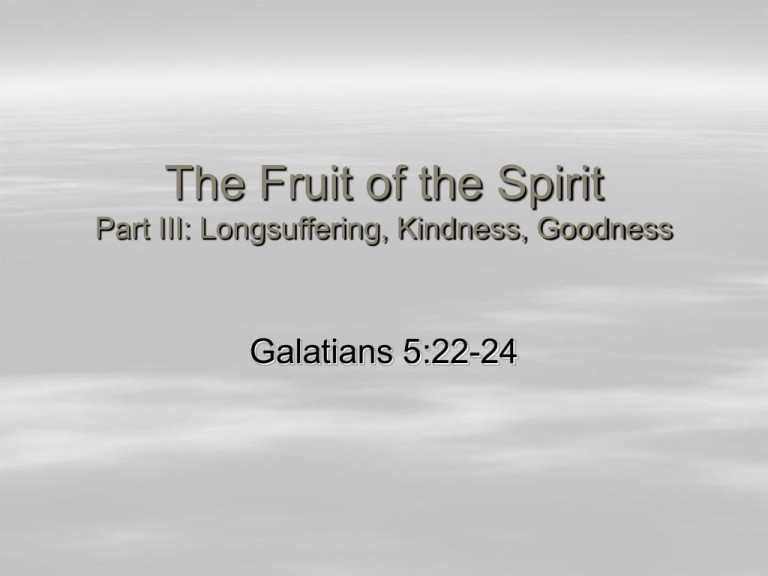fruitspirit3_phillips - Avondale church of Christ
advertisement

The Fruit of the Spirit Part III: Longsuffering, Kindness, Goodness Galatians 5:22-24 The Division of the Fruit In the first division of fruit of the Spirit we discussed virtues of the mind, attitude: – Love, – Joy, – Peace. In this second division we will be discussion virtues that relate to our conduct toward others – Longsuffering, – Kindness, – Goodness. The Nature of the Fruit These are parts of one singular fruit. Together they make up the fruit (singular) of the Spirit. These are characteristics that originate from God. – They are defined by His character. – When we fill ourselves with the Spirit they manifest themselves in us. – Therefore they are the fruit, the result, of the Spirit in us. As in the last lesson, we will consider how God manifests these virtues to better understand how we must manifest them in our lives. Longsuffering makrothumia: – makro: “long” – Thumia: “temper” It suffers or endures long without allowing itself to be provoked (as opposed to a quick tempered person). It does not retaliate out of anger. Vine describes it as: – “Self-restraint” – “Does not hastily retaliate or promptly punish” – “It is the opposite of anger.” James 1:19 illustrates longsuffering in action, “So then, my beloved brethren, let every man be swift to hear, slow to speak, slow to wrath.” Longsuffering As God is longsuffering toward us, He is our perfect example: – 2 Pet. 3:9: “The Lord is not slack concerning His promise, as some count slackness, but is longsuffering toward us, not willing that any should perish but that all should come to repentance.” – God has promised judgment and salvation. – Some have asked, “Why does God wait so long?” – The Lord is not slack: He is not lazy, does not procrastinate. – He is waiting to give us time to come around, to avoid His wrath. – God hates sin, it provokes Him (Ps. 11:5). – Therefore, He is showing great longsuffering as He endures our sins, giving us time to repent and turn to Him. The longer God waits, the greater our opportunity for salvation (2 Pet. 3:15). Longsuffering We must learn to suffer long with others as God does with us! – Col. 3:12-13: – Elect: we are chosen by God based on our faith and obedience to the gospel. – When we make this commitment, God makes us holy. We are beloved of Him. – Such a relationship brings great responsibility. – We must put on the character of God which includes longsuffering. Vs. 13: How to suffer long with one another. – Forbearing: patient, kind in areas of friction or conflict. – Forgiving one another: seeking opportunities to put complaints and debts behind. Kindness, Gentleness chrestotes: goodness of heart, kindness, serviceable, good, pleasant, gracious, kind. – Translated in NKJ, NAS, ASV as “kindness” – KJV as gentleness. – While we are suffering long with one another it stands to reason that we are to do so with kindness and gentleness. Titus 3:4-5: God’s kindness is seen in the fact that He gave His son. – He did not send His wrath immediately (which is what we deserve because of sin). – Rather, He showed kindness by first giving us the means to be saved from our sins. – He showed gentleness in His invitation, as in Matt. 11:28-30. Kindness, Gentleness Seeing that God showed kindness toward us in spite of our sins, His Spirit ought to bear that same kindness in us. Therefore Paul wrote in Eph. 4:32, “And be kind to one another, tenderhearted, forgiving one another, even as God in Christ forgave you.” This kindness ought to affect all areas of our lives. – God is kind and gentle toward all of our needs. – So we ought to be kind in all of our dealings with others. – Our speech, manner of address, willingness to help in times of need, etc. Rom. 11:22: As we show kindness toward others, so God will show it toward us (translated goodness here). Kindness, Gentleness Point of consideration. – Our kindness ought to mimic God’s. – God’s kindness is patient toward our weaknesses as we strive to overcome them. – But it does not overlook rebellion. – Even so, we ought to be kind, yet our kindness must not compromise God’s truth or the moral purity of His church (Acts 15:1-2; 1 Cor. 5:1-7). Goodness agathosunee: “goodness.” – Signifies a moral quality that is “good” in its character. – Is used of physical things such as a tree (Matt. 7:17-18), ground (Matt. 13:7). – This is different than in Rom. 11:22, which speaks of the manner of our interaction with others. – Instead, this speaks of the condition of our being. We are either good or bad. God is good: Matt. 19:17 – God is love because He is the ultimate standard of love. – He is good for in Him are all things good and from Him come all things that are good (James. 1:17). Goodness It is this standard of goodness that we must strive to have in ourselves. 2 Thess. 1:11: “Therefore we also pray always for you that our God would count you worthy of this calling, and fulfill all the good pleasure of His goodness and the work of faith with power…” – God promises good things to those who please Him. – His “good pleasure” is that which seems good for Him to do for us and is based on His standard of goodness. – This has a two-fold application. His good pleasure is our hope and glory (see vs. 12). Just as His desire is in every way good, so must ours be. We must strive in all things to both be good and desire good. Goodness 1 John 1:5: “…God is light and in Him is no darkness at all.” – God is light because there is no darkness in Him. – God is good because there is no evil in Him. – We are good insomuch that we imitate His goodness. “I am a good person. Why is that not enough?” A “good person” is one who walks according to God’s standard and agrees with Him in all things. – Therefore, if we are to have goodness in us, we must remove all things that are not good from our lives that there be “no darkness in us.” – We must add those thigns which God says are good. Goodness The applications of this are far reaching indeed. – In order for us to be good we must remove that which is not good. – What is wrong with drinking, drugs, smoking? They are not good! – What is wrong with tattooing our bodies? It is not good! – What about gambling, carousing, cursing? Let us put these things away from us for the simple fact that they do not encourage but actually hinder the goodness of God in our lives. (Gal. 5:19-21). Goodness When we cast away that which is not good, we make room for goodness to increase in our lives. How do we learn the goodness of God? – Rom. 15:14: “Now I myself am confident concerning you, my brethren, that you also are full of goodness, filled with all knowledge, able also to admonish one another.” – Be filled with knowledge of God and His ways. – Instruct and correcting one another, admonishing one another to continue in goodness. – Luke 6:45: When we apply our heart to know and love what is good then our actions will be good. Conclusion The fruit of the Spirit is what we bear when God’s spirit is in us. We determine whether or not His Spirit is in us by the way we choose to live. If you desire to have this relationship with God and to fill your life with the fruit of the Spirit you can begin today if you come to God by obeying the gospel. Acts 2:38: Will you come?








